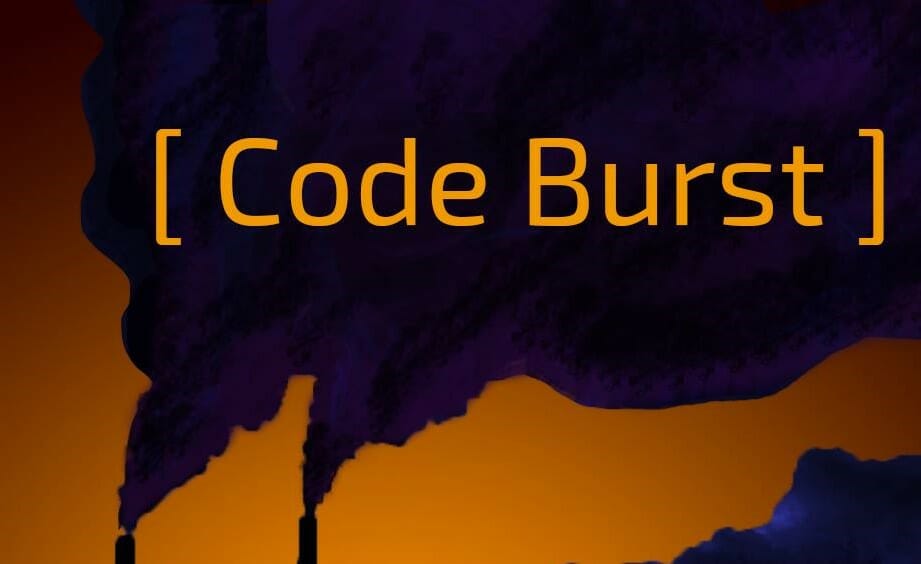
In mining, there’s something known as rock burst. It happens in deep mines and tunnels around the world. Deep drilling causes the rock to shift and buckle. Shards can unexpectedly burst from the tunnel walls, injuring or killing miners.
Code Burst is a story about a violent, unexpected shift in the structure of the global economy. It focuses on a coding bootcamp called Mined Minds and involves the growing skills gap, the tech industry, the increasing obsolescence of higher education, and one married couple who either tried to make a difference, or tried to make a buck. This is a story about trust.
Last week, I spent most of the episode introducing the coding bootcamp Mined Minds and going over their media coverage. It has been contradictory to say the least. This week, I’m going start from the beginning, lay down their backstory, and discuss what people close to the non-profit, free coding bootcamp have to say about it.
All of the following information that I’m going to lay out has either been confirmed by two or more news sources, or has not been directly refuted.
Backstory
Some years ago, Amanda Laucher, a native of Nemacolin, a coal mining town in Greene County Pennsylvania, was traveling in Lithuania. On her travels, she met Jonathan Graham, an Englishman. Both had studied computer science in one form or another. Graham had recently developed a platform that allowed for live-coding music. They fell in love, married, moved to London, and later relocated to Chicago, where the two took up lucrative tech consultancy jobs that, combined, grossed about $500,000 per year.
For July 4th, 2015, the couple traveled back to Laucher’s hometown in Greene County, PA. They were surprised to learn that Amanda’s brother, Marvin Laucher, was worried about his job security. He worked at the nearby Consol Energy Enlow Fork coal mine, and it seemed like the company was going belly up. There had already been multiple rounds of layoffs, each of which he had survived. But many of his friends had lost their jobs, and he also supported a wife and three kids. He could tell which way the wind was blowing.
Amanda and Jonathan encouraged Marvin to learn to code. They were making a tidy sum, they told him, and there’s no shortage of jobs. The more they thought about it, in fact, the more they realized that the whole region could benefit from an education in computer coding.
Beginning in August, the couple began organizing their first program. They spread the word via paper leaflets and Facebook. They operated out of the town’s fire hall where the Wi-Fi was so slow, they resorted to using mobile hot spots. Among their students was Marvin, Joseph McKenzie, who I’ll speak with later in the show, and eight others.
Laucher and Graham drove the eight hours from Chicago every weekend and conducted virtual sessions on Wednesday evenings. They began by teaching their students Ruby, a language that could be applied to many different tasks. The weeks passed. The course concluded. In January of 2016, while Laucher and Graham were holding an informational session for their second run of their bootcamp, the first journalist stepped in the door.
Daniel Moore, accompanied by photographer Michael Henninger was developing a longform feature for the Pittsburgh Post-Gazette. The product of their labors, “The boom and bust of Pennsylvania Coal Towns” is an excellent read and marks the first coverage of the Mined Minds coding bootcamp.
As Moore writes, “Where coal miners in the past would congregate,” referring to the town hall in which the coding instructors were conducting their event, “Jonathan Graham and Amanda Laucher were hoping to convince residents that computer programming — not digging more coal — can help save this town that has crumbled since the Buckeye Mine closed in the 1980s.”
Moore describes Laucher, Graham, and Mined Minds as idealistic yet slightly naïve heroes, struggling in the face of significant adversity, investing huge amounts of time into a cause that might not pay off.

The piece bears quoting at length, because it would come to inform much, if not all, of the following coverage of Mined Minds.
“She and Mr. Graham had a series of rhetorical riffs: Why is Silicon Valley the only place coders can make a living? Why do local businesses have to call developers in other time zones when they need affordable software development? Why are Greene County workers relegated to the whims of the extraction industry? And: Why can’t we teach classes here for free that cost thousands of dollars for people in cities?
At the January information gathering at the fire hall, some of the students stood up to speak about what the classes — and the prospect of more business in town — means to them.
Marvin Laucher told the gathering, “They told me there’s enough coal for 40 years, that your kids can come work. Now I’m starting to think, what am I going to do? Coal isn’t going to be around forever.”
The next speaker was Shane Baker, who put in seven years as a contractor at Enlow Fork and carpooled to work with Marvin Laucher. Days after he decided to join the spring class, GMS Mine Repair & Maintenance laid him off. “I never thought I’d do something like this,” “I thought that was my career. … But I don’t want to worry about the industry shutting down one day.”
The Ball Starts Rolling
By the spring of 2016, they began to get national coverage. CNN published a report followed by PBS and WNYC’s The Takeaway.
To be perfectly clear, I believe every word, along with the integrity of every person, quoted in Moore’s article at the time that it was published. I don’t think Laucher and Graham intended at this point to carry on practices that would one day lead to what some reports name as 60 of their former students joining together to file a class action lawsuit against them. And I’m not sure they have ever done what many of their ex-learners contend. I believe that Laucher and Graham were coming from a really good place, that they wanted to help the Laucher’s hometown, and that they made pretty significant commitments of time and money to do so.
Between their first bootcamp run and the lawsuit, something got misplaced. Something lead journalists to brand Mined Minds as ‘new collar grifters,’ or people that overpromise and underdeliver, folks that went after federal grants, educators who defrauded their students, and ultimately, hypocrites.
If I were doing something good, and people said those things about me, I’d get angry. That was also Joseph McKenzie’s reaction.
Joseph enrolled in the first Mined Minds course in Nemacolin. He had a very different experience from the former students who told KDKA Pittsburgh, a CBS affiliate that Laucher and Graham had “overpromised and underdelivered” last November.
Joseph McKenzie: Hello
Henry Kronk: Hey Joseph, can you hear me?
JM: Yes
HK: Sweet, could you begin by introducing yourself?
JM: Yeah, I’m Joseph McKenzie, I grew up in Greene County, PA. I’ve always liked computers.
HK: Could you tell me about the first time you heard about Mined Minds?
JM: It was over three years ago. I was browsing on Facebook and I saw that there was an open house that they were doing where they were going to tell people about an idea they had to bring the tech industry to the rural southwest area of Pennsylvania and West Virginia. They said they were going to teach people how to program and I wanted to check it out. I didn’t know nothing about how to program and I had no idea what I was getting myself into but I wasn’t doing much at the time and I thought why not go and see what they had to offer.
HK: And as the course went on, what was your experience with learning to code?
JM: Wonderful. They started out teaching us Ruby, which is a really fantastic language to learn to code with. Then [we] learned HTML, CSS—which is the backbone for websites—JavaScript, and moved on from there to what I really love which is online cloud functions and server-less architecture dealing with Lamda and RDX databases, stuff like that.
HK: How long did the initial program run?
JM: Probably about 6 months.
HK: And what happened when it finished?
JM: They offered me a fulltime job and I took it.
HK: What kind of work were you doing early on?
JM: We were building websites for clients around here and in West Virginia, we built a web program for a chain of grocery stores to help out with some security stuff, and some other stuff like that.
HK: Were you working full time for them at this point? Did they have clients to keep you busy?
JM: We really didn’t have too many clients at the start but I was working full time. We had enough work to keep us busy.
HK: And what about your classmates? Were they hired on and working as well?
JM: Yeah, it was me and one other lady that got hired on and were working at first. A month later, a couple more got hired. Everyone who completed the course at that point got hired.
HK: And since, you’ve gone freelance, is that right?
JM: Yeah.
HK: And how is that work treating you?
JM: Wonderful. I mean sometimes it’s slow and stuff, but I love it. I get to work on my own schedule, my own hours, whenever I want to. The pay all depends on what clients you’re currently working for and stuff like that. I feel bad sometimes for people and give them discounts but maybe I shouldn’t but whatever, they have to work with me and I’m still learning. They’re helping me, I’m helping them, everyone’s happy.
HK: From a lot of people I’ve spoken to, I’ve heard nothing but good things about Mined Minds and about Amanda and Jonathan. But there’s also a lot of negative press out about them as well. Are you aware of the various investigative reports and the lawsuit filed against them?
JM: I am aware of it, yes. I like to keep up with everything.
HK: Does it seem strange and totally out of the blue for you like it does for me?
JM: Well, I don’t understand it. I’ve worked with a lot of these people that make these claims. I can’t say how they feel, but they’re really smart people and, if they just put the footwork into it … I know with me, it took a lot of resumes in and a lot people saying no, and constantly learning, and doing more work, and not make any money. I mean, it’s not easy. You can’t just put one resume in and get hired right away.
HK: What about the people who said they were offered a work apprenticeship, got hired after completing the course, and then were fired a few days later?
JM: I’m not really sure about that. It seems crazy to me.
HK: Nothing like that happened with you guys?
JM: No, hell no. I’ve loved Mined Minds since day one and it’s been three and a half years. I’ve been with them in and out, in and out. They’ve always been really good to me and everyone I’ve known. I just don’t understand some of what’s going on right now. It gets me angry when I hear people talking bad about them. They’ve done so much for me personally and in a business sense along with everyone I know. They paid so much money out of their own pocket when the first class started. They were coming in from Chicago every weekend and no one was paying their gas. They bought me a brand new computer because I didn’t have a good one, every time it would come unplugged, it would shut off. They are some of the nicest people I have met in my long life and I’ve only known them for three years.
Branching Out
This can get confusing, but Mined Minds began their operations in Waynesburgh, Pennsylvania, which is in Greene County, near where Amanda grew up. After their success in Waynesburgh, they began to partner with the Community College of Allegheny County (CCAC), which is based also in Pennsylvania. While they were still partnering with CCAC, they expanded into West Virginia and went on from there. The students who first voiced their discontent regarding Mined Minds to investigative reporter Andy Sheehan, they were from a run at CCAC. The students who filed a class-action lawsuit, they’re from West Virginia.

The two students, Max Pokropowicz and Brian Lewis who spoke to KDKA’s investigative reporter Andy Sheehan leveled the following claims:
They said they were promised a four to six month apprenticeship.
So was Joseph, but he wasn’t fired.
Pokropowicz said “Without that six months experience, it’s pretty hard to find a solid employer who’s willing to take a chance on you, and say okay we’ll hire you.”
Joseph had that benefit.
But Joseph also reiterated how hard he worked to get where he did. None of this was easy. By Andy Sheehan’s own reporting, only 7 of the 20 students at the Community College of Allegheny County who took the program graduated. Of those 7, six were soon let go.
As KDKA reported, the Community College of Allegheny County has since dissolved their relationship with Mined Minds. They began their partnership back in August of 2016.
CCAC released a statement in July 2016 saying the following:
“This is the first time CCAC has partnered with Mined Minds, which is based on the premise that anyone can have a successful career in the technology industry. The organization has successfully taken residents of Southwestern Pennsylvania through its training program into full-time positions as software development consultants.
“Partnering with CCAC brings great advantages to the students,” explained Amanda Laucher, who co-founded Mined Minds with Dr. Jonathan Graham. “In addition to gaining the skills required to start a new career within the technology industry, participants will be able to access student support from the college and receive a co-branded certificate of completion as well as continuing education credits upon successful completion.”
Most computer-coding boot camps are based in major cities and have significant tuition costs, according to Brian Hannon, director of the Center for Professional Development at CCAC. What sets this course apart, Hannon said, is that participants can fully fund the tuition through opportunities that are available through PA Career Link, or they can self-fund at a very reasonable cost.
Laucher and Graham use their wealth of industry experience to assist successful students with job placement. They also provide the opportunity for potential employment with Mined Minds Consulting, which offers software development consultancy services for local, national and international firms.”
For their fall 2017 report, CCAC wrote the following: Our Coding Boot Camp, in partnership with Mined Minds, has been selected as a top 25 university affiliated coding boot camp. Join our Pittsburgh coding cohort this fall.
There were two important points there. First, the coding bootcamp offered the potentialll for employment with the Mined Minds consultancy firm. I’m not saying that hiring someone on for a couple days and then firing them is a great thing to do, but it kind of seems like Pokropowicz and Lewis didn’t read the fine print.
The second point: when Mined Minds partnered with CCAC, the bootcamp wasn’t free. They could get funding from something called PA Career Link or self-fund at a very reasonable cost.
I got in touch with Elizabeth Johnston who is the executive director of PR and marketing at CCAC. I wanted to get three pieces of information from her: what was the nature of the partnership with Mined Minds? Was it free, or did students need to pay for it, and why did the partnership end?
Johnston told me the following “the class was tuition-based; although those enrolled happened to qualify for training under the Workforce Innovation and Opportunity Act). As the college is always interested in training/re-training un/underemployed individuals in new and innovative ways and coding jobs are growing, CCAC hired a noncredit instructor with expertise in coding and teaching. After the initial semester, which only enrolled five to six students, the college made the decision to move in a different direction.”
Unfortunately, I’m not sure how much I can trust Johnston because some of this information is incorrect. Mined Minds did run for more than one semester. I know this because I checked the course offerings for 2016 and 2017. Also, the press release I just read had nothing to say about the Workforce Innovation and Opportunity Act. But it did mention funding via the PA Careerlink. When I pressed her on this, she responded saying
“I misunderstood; we actually ran the program twice; once in the fall of 2016 and again in the spring of 2017. Five CCAC students were enrolled in the fall of 16, one in the spring of 17; apparently, these students were mixed in with Mined Mines’ other clients.
And too, funding was available via Career Link. We placed the program on the ETPL (education and training providers’ list) through the CWDS (Commonwealth Workforce Development System) Career Link.”
I don’t know how true this info is, but a few things seem to be pretty plausible. First, it seems like the partnership with CCAC ended simply because there wasn’t enough interest. Second, it seems that most, if not all students were allowed to attend the bootcamp for free, but that doesn’t mean that Mined Minds wasn’t making any money. I have a hard time believing that CCAC is getting all of the CareerLink and/or workforce innovation and opportunity act funds when they’re not pulling any water in the effort.
So then – what happened with Brian Lewis and Max Pokropowicz. I’m going to take an educated guess.
The folks at Mined Minds had a good chunk of change saved up when they started this venture, but by the summer of 2017, after operating for over a year, the well had begun to run dry. These guys weren’t just renting space, they were buying their learners new laptops. They came to rely more and more on their consultancy work. They hadn’t necessarily lost any of their passion, but they still needed to be able to keep the lights on.
Along with that, I don’t think that they had as much success with their consultancy work in the local or even national market as they had initially hoped. Joseph McKenzie attests to this as well.
After a few runs of the bootcamp at CCAC, they couldn’t afford to employ someone who wouldn’t be able to deliver solid results. Out of necessity, they raised their standards for their apprenticeship program, which, after all, totally depended on the business they could bring in.
It’s entirely possible that Max Pokropowicz and Brian Lewis simply couldn’t meet flush with Mined Minds bottom line. In other words, it may not have been any fault of theirs that they were let go. Maybe Mined Minds just wasn’t bringing in the business to employ them.
You have been listening to Code Burst. This episode was produced as a collaboration between ckut 90.3 fm and elearning Inside news. Check out elearninginside.com for a story accompanying this episode which includes transcripts of the interviews and links to the resources I used to compile this information. I would like to say thanks to Evan Dent and Tamara Filyavich for helping me put this episode together. All of the music you heard throughout is from Daniel Monkman who is currently playing under the name Bloom. His LP containing these tracks is forthcoming. And thanks Joseph McKenzie for offering to help me out with the web development course I’m taking. My name is Henry Kronk, thanks for listening.









[…] By Henry Kronk, eLearningInside News. This article was originally posted at news.elearninginside.com […]